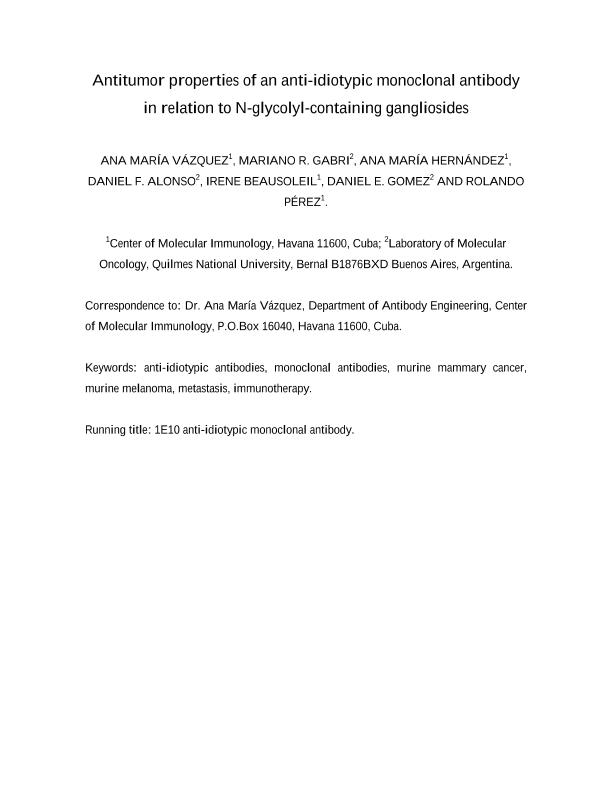Artículo
Antitumor properties of an anti-idiotypic monoclonal antibody in relation to N-glycolyl-containing gangliosides
Vázquez, Ana María; Gabri, Mariano Rolando ; Hernández, Ana María; Alonso, Daniel Fernando
; Hernández, Ana María; Alonso, Daniel Fernando ; Beausoleil, Irene; Gomez, Daniel Eduardo
; Beausoleil, Irene; Gomez, Daniel Eduardo ; Pérez, Rolando
; Pérez, Rolando
 ; Hernández, Ana María; Alonso, Daniel Fernando
; Hernández, Ana María; Alonso, Daniel Fernando ; Beausoleil, Irene; Gomez, Daniel Eduardo
; Beausoleil, Irene; Gomez, Daniel Eduardo ; Pérez, Rolando
; Pérez, Rolando
Fecha de publicación:
07/2000
Editorial:
Spandidos Publications
Revista:
Oncology Reports
ISSN:
1021-335X
e-ISSN:
1791-2431
Idioma:
Inglés
Tipo de recurso:
Artículo publicado
Clasificación temática:
Resumen
We examined the antitumor effects of 1E10 monoclonal antibody, an anti-idiotypic IgG to an IgM monoclonal antibody, named P3, that reacts specifically with N-glycolyl-containing gangliosides and also recognizes antigens in human breast and melanoma tumors. Two murine tumor cell lines positive for the P3 antibody, F3II mammary carcinoma (BALB/c) and B16 melanoma (C57BL/6), were employed. In BALB/c mice, vaccination with several i.p. doses at 14-day intervals of 50 microgram of 1E10 coupled to keyhole limpet hemocyanin in Freund's adjuvant, significantly reduced s.c. tumor growth of F3II carcinoma cells and the number of spontaneous lung metastases. Also, the effect of 1E10 as a biological response modifier on tumor lung colonization was evaluated in C57BL/6 mice injected i.v. with B16 melanoma cells. Interestingly, i.v. administration of 10 microgram of uncoupled 1E10 antibody, 10-14 days after inoculation of B16 cells, dramatically reduced the number of experimental metastases in comparison with lungs from mice treated with an irrelevant IgG. The present data suggest that this 'non-internal image' anti-idiotypic monoclonal antibody may activate more than one mechanism of antitumor response against melanoma and mammary tumor cells.
Archivos asociados
Licencia
Identificadores
Colecciones
Articulos(SEDE CENTRAL)
Articulos de SEDE CENTRAL
Articulos de SEDE CENTRAL
Citación
Vázquez, Ana María; Gabri, Mariano Rolando; Hernández, Ana María; Alonso, Daniel Fernando; Beausoleil, Irene; et al.; Antitumor properties of an anti-idiotypic monoclonal antibody in relation to N-glycolyl-containing gangliosides; Spandidos Publications; Oncology Reports; 7; 7-2000; 751-756
Compartir
Altmétricas



